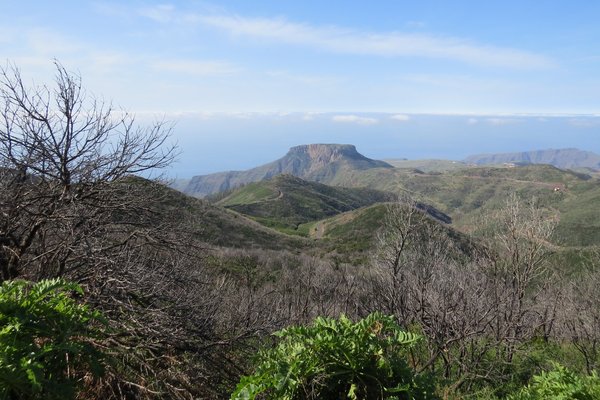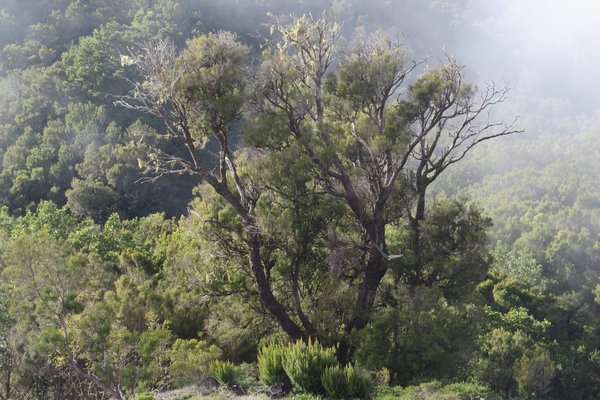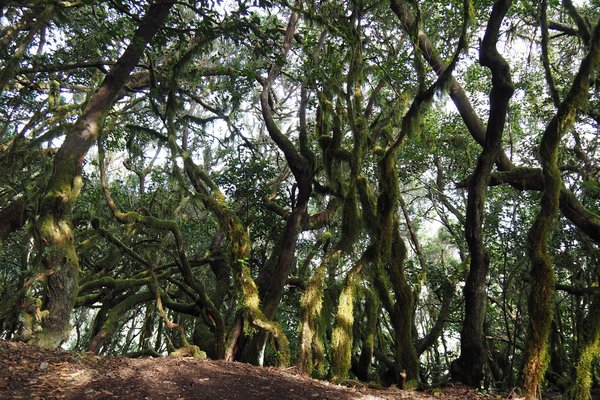Spain
Garajonay
Garajonay National Park preserves one of the best examples of laurisilva, a humid subtropical forest that in the Tertiary covered almost all of Europe.
The park on the island of La Gomera comprises forests made up of laurel-leaved evergreen hardwood trees, reaching up to 40 meters in height. Many of its species are endemic to the islands, and harbor a rich biota of understory plants, invertebrates, and birds and bats. It is one of the best places to observe the two Canarian endemic pigeon species.
Community Perspective: La Gomera can be done as a day trip from Tenerife (like Shandos did). Els did a day hike to the top of Garajonay, arriving on public transport, while Solivagant and Clyde have provided interesting itineraries if you have a (rental) car. You can take a car with you from Tenerife as well, but the ferry crossings are expensive.
Site Info
Official Information
- Full Name
- Garajonay National Park (ID: 380)
- Country
- Spain
- Status
-
Inscribed 1986
Site history
History of Garajonay
- 1986: Inscribed
- Inscribed
- Type
- Natural
- Criteria
- vii
- ix
Links
- UNESCO
- whc.unesco.org
- Official
-
- lagomera.travel — National Park
- Related
-
- summitpost.org — Hiking info by SummitPost
All Links
UNESCO.org
- whc.unesco.org — whc.unesco.org/
Official Website
- lagomera.travel — National Park
Related Resources
- summitpost.org — Hiking info by SummitPost
News Article
- 6 Aug 2012 gulfnews.com — Wildfire threatens Canaries World Heritage site
- 30 Apr 2008 reuters.com — Hundreds of fire fighters, backed by planes and helicopters, are fighting to stop a fire spreading into Garajonay National Park
Community Information
- Community Category
- Natural landscape: Forest
Travel Information
Recent Connections
-
Named after a Mountain
Garajonay (1,487m) -
Miocene
It arose about 10-12 million years ago,… -
World Heritage Forest Programme
Connections of Garajonay
- Geography
-
-
Atlantic Ocean
Laurel forest is specific to the North Atlantic -
Volcanic plugs
Roque de Agando, Roque de la Zarcita and Roque de Ojila. -
Macaronesia
-
- Trivia
-
-
Viewable from another WHS
The southern slopes of Garajonay NP are visible from the Teide peak but also from many locations within the Western part of Teide NP.
-
- Ecology
-
-
Cloud forest
dense dominant cloud forest of El Cedro (UNEP-WCMC) -
Endemic Bird Species
"Two species of bird, white-tailed and dark-tailed laurel pigeon, are endemic to the Canaries" (ab ev) -
Fog drip
See academic.oup.com
-
- Damaged
-
-
Wildfires
2012 -
Affected by Climate Change
Examples where climate change has facilitated the spread of invasive alien species include … Garajonay National Park (Spain). (IUCN outlook 2020)
-
- World Heritage Process
-
-
Perfect Inscriptions
1986
-
- Religion and Belief
-
-
Sacred Mountains
Sacred to the Guanche. At Alto Garajonay there are the remains of a Guanche sanctuary -
Legends and Folk Myths
The mountain is named after the legend of Gara and Jonay. For the story:See en.wikipedia.org
-
- WHS on Other Lists
-
-
Centres of Plant Diversity
AO2 Canary Islands - "a recorded flora of 450 vascular plant species, of which 34 are endemic to the island and eight found only in the national park." -
Biodiversity hotspot
Mediterranean Basin -
Located in a TCC Territory
Canary Islands -
World Heritage Forest Programme
-
World Biosphere Reserves
La Gomera Biosphere Reserve (2012) -
Natura 2000
See ec.europa.eu
-
- Timeline
-
-
Miocene
It arose about 10-12 million years ago, when huge blocks of the oceanic crust emerged from the ocean floor and different volcanic episodes increased its size.
-
- WHS Names
-
-
Named after a Mountain
Garajonay (1,487m)
-
News
- gulfnews.com 06/08/2012
- Wildfire threatens Canaries World …
- reuters.com 30/04/2008
- Hundreds of fire fighters, backed …
Recent Visitors
Visitors of Garajonay
- Alberto Rodriguez Gutierrez
- Alexander Lehmann
- Alikander99
- Ali Zingstra
- A. Mehmet Haksever
- Ana Lozano
- Argo
- Atila Ege
- AustralLights
- AYB
- Badwater
- BaziFettehenne
- Bin
- Bram de Bruin
- Brendan Carroll
- Cezar Grozavu
- ChrisN
- Christer Sundberg
- Christravelblog
- Clyde
- Colossus
- ctravel
- Dani Cyr
- Daniela Hohmann
- Dimitar Krastev
- Els Slots
- Emilia
- Erik Jelinek
- fabi-ddorf
- Fan Yibo
- Gary Arndt
- Geert Luiken
- George Gdanski
- grimloch
- HaraldOest
- Harry Mitsidis
- Iain Jackson
- ih0000
- Ivan Rucek
- Jana and Matt
- Jan-Willem
- Jan Zimmermann
- Jarek Pokrzywnicki
- Jay T
- Jens
- Joel on the Road
- Jonas Kremer
- Joyce van Soest
- KarenBMoore
- Kbecq
- krtek
- Lara Adler
- Loic Pedras
- Luis Filipe Gaspar
- Lukasz Palczewski
- Maciej Gil
- marcel staron
- marc Rouserez
- Marlies van Wolfswinkel
- Martinacurra88
- Martina Rúčková
- Matthewsharris
- MAURO PODDA PANI
- MH
- Mikan22
- Mikko
- MMM
- Nicole Lampos
- Nihal Ege
- PabloNorte
- Patrik
- Patrik_globe
- PeterH
- Peter Lööv
- Philipp Leu
- Philipp Peterer
- Randi Thomsen
- Roel Sterken
- Roger Ourset
- Roman Bruehwiler
- Sabrina Liebehentschel
- Sergio Arjona
- Shandos Cleaver
- sibariam
- Solivagant
- Stanislaw Warwas
- Stijn
- Svein Elias
- Szucs Tamas
- Tarquinio_Superbo
- Tatiana Nikulnikova
- Thomas Buechler
- Tonisan
- Vanessa Buechler
- voyager
- WalGra
- Walter
- Wieland
- Wojciech Fedoruk
- Wo_ko
- YaroMir
- Zoë Sheng



